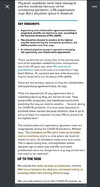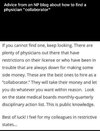Residents reporting to NPs in a supervisory role is clearly against ACGME requirements, and these programs should be reported to the ACGME. Additionally, these residents have essentially zero protection against malpractice lawsuits under these conditions, which is a massive risk in acute stroke. I'm not questioning your story but the residents in these programs need to stand up for themselves as this is extremely legally questionable territory both from accreditation standpoint and malpractice. I doubt this is 'many' programs, and whatever program this has probably has no idea of the legal exposure they have created themselves and their residents.
Again, I agree with everyone here about the threat NPs pose, and that politically it needs to be opposed as strongly as possible (especially at the AAN). And, I did not stay there is zero risk of encroachment. Clearly there has already been encroachment, NPs doing headache completely independently, many NPs in subspecialties having no oversight. My point is that we are not in as terrible shape as FM, IM, anesthesia, and EM which are literally being wholesale replaced by corporate hospital groups in nearly a 1:1 fashion as fast as possible. I don't think we are that replaceable right now. NP 'fellowships' are certainly the big concern but I don't know how much power we have to stop them.
Staring into the future in 10-20 years, there will be a massive oversupply of midlevels of all stripes. They won't be able to get hired without direct experience in the field they wish to work, and MDs will always be preferred, but the economic hit to our salaries could be very large. The only major factors that could prevent this trend from accelerating would be 1) a major media event that brings to public consciousness how poor midlevel qualifications and training are (essentially a Libby Zion level event) or 2) cleverly crafted widespread legal action combined with jurisprudence across multiple states that makes it very expensive to insure midlevels. The issue with this currently is in most states only NPs can testify regarding NP 'standard of care' and it is hard to hold large organizations legally accountable for hiring poorly trained midlevels. Small scale political actions on our part are not going to be effective against the sheer profitability of using NPs and the huge delays in getting neurological care due to shortages. In fact you may risk getting the 'disruptive physician' label reported to NPDB by administration if you make a large fuss in your own system about getting NP consults or working with/near an NP.


